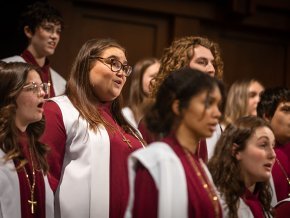Religious Studies, B.A.
The religious studies major aims to help individuals clarify their religious convictions and life goals, think critically about themselves and the world in which they live, and develop a range of cognitive skills that can be transferred to a variety of important life situations
Request Information
Take the next step toward completing your Bachelor of Arts in Religious Studies degree at Lenoir-Rhyne University.
Get StartedTake the next step toward completing your Bachelor of Arts in Religious Studies degree at Lenoir-Rhyne University.
Program Tracks
-
Religious Studies
This 36-hour discipline explores ideas and texts that have profoundly shaped human history and identity. It is an academic field of multi-disciplinary, non-confessional study of religious beliefs, behaviors and institutions. Through coursework and in-depth discussion, you explore, compare, interpret and explain religion, emphasizing systematic, historically based and cross-cultural perspectives. - Youth and Family Ministry
This discipline 39-hour program shares similar coursework, but further focuses on providing practical training and hands-on experience working in religious organizations as well as social service agencies and other community-focused and non-profit organizations throughout the region. This program blends a rich attention to the academic components of religious study with applied study and experiences.
When I took Religion 100 with Dr. Schwiebert, he pushed my thinking, and I started to consider seminary. Between studying sacred music and religion at LR, I was well prepared for seminary.
Learning Outside of the Classroom
Religious Studies students benefit from a variety of opportunities outside of the classroom, which offer the experience and training employers seek. A wealth of service opportunities exist on- and off-campus, from chapel and student-led organizations to internships and conferences.
Internships and mentor opportunities help you gain valuable experience, working alongside professionals in non-profit, social services or religious based organizations. There are a number of student organizations at LR which provide spiritual support and service opportunities such as Lutheran Student Movement, InterVarsity and the Newman Club.
You can also take advantage of many programs offered through LR's Institute for Faith and Learning. Aimed to inspire and enlighten people of all faith traditions, the institute features speakers and hosts events aimed at addressing issues facing the world today through a theological lens.
Career Opportunities
Success in religious studies or youth and family ministry opens doors to a full range of graduate programs or a variety of career opportunities. Studying religion gives you a unique set of skills in critical thinking, understanding other cultures and observation. These skills are often highly sought after by employers.
Religion graduates know how to synthesize ideas, how to explain ideas to others, how to persuade others to their point of view, and how to understand the people who make any business work.
You learn all types of skills that are transferable and marketable: reading and analysis, speaking and writing, picking up ideas quickly, critical thinking, pedagogy, pattern-finding, drawing conclusions from evidence, persuasion, among others.
As a religion student, you are encouraged to think about why you are on earth, about where you are going, about what some of the greatest and most creative thinkers in the past have said about the meaning of human existence and about what is most worth doing in life.
These skills and dispositions translate generally to a wide range of professional opportunities. More specifically, religion majors are prepared for graduate school and/or for career opportunities in the ministry, social activism and advocacy, governmental or non-profit agencies, Christian education, counseling and human services, and in higher education.
Major Requirements
Undergraduate programs of study are available in religious studies and youth and family ministry. Courses completed in either program are designed to help individuals clarify their religious convictions and life goals, as well as to provide preparation for persons who anticipate further study. Both majors earns a B.A. degree.
Honors
Students majoring in religious studies or youth and family ministry and who are judged qualified by the religion faculty may, upon invitation, elect to pursue honors work in religion. To graduate ''With Honors,'' students must have a minimum cumulative GPA of 3.0, a minimum major GPA of 3.2, and complete nine credits of honors courses in religion, including REL 499. In addition, they must be nominated for honors by the religion faculty.
Special Features
- Students who major in two areas offered by the religious studies and philosophy programs may count only six credits from courses used to fulfill the requirements of the first major to fulfill the total credit requirement of the second major.
- A similar limitation applies to the student who elects both a major and minor offered by religion and philosophy programs, except that in such instances only three credits of duplicate course credit may be applied.
-
General Education Requirements (37 hours)
Graduation Requirements (4 hours)
General Education Requirements
-
Technical Requirements (3 Hours)
- REL 100 - The Christian Faith
- or
- REL 103 - Encountering Religion
- 3 hours from PHI 100-499 Hours: 3
- Major Requirements (18 Hours)
-
Concentration Choice
Choose one concentration below (21-24 hours)
Students may opt to complete more than one concentration by ensuring they have completed the required courses for each concentration. Students are allowed to double count courses across concentrations.
-
Youth & Family Ministry Concentration (24 hours)
Take all concentration course requirements (12 hours):
- REL 125 - Foundations in Religious Development
- REL 126 - Methods in Religious Development
- REL 215 - Engaging Religion and Culture
- REL 351 - Internship I
- or
- REL 352 - Internship II
Choose two courses (6 hours):
- REL 105 - Reading Scripture
- REL 106 - Poverty and the Bible
- REL 150 - Spirituality in the Contemporary World
- REL 151 - Celtic Spirituality
- REL 170 - Sex, Gender and Religion
Choose two courses (6 hours):
- REL 225 - Sin and Suffering
- REL 245 - Martyrdom in Christianity
- REL 250 - Christian Spiritual Practices
- REL 264 - The Life and Teachings of Jesus
-
Spirituality Concentration (21 hours)
Take all concentration core course requirements (12 hours):
- REL 105 - Reading Scripture
- REL 150 - Spirituality in the Contemporary World
- REL 151 - Celtic Spirituality
- REL 250 - Christian Spiritual Practices
Choose one course (3 hours):
- REL 106 - Poverty and the Bible
- REL 125 - Foundations in Religious Development
- REL 126 - Methods in Religious Development
- REL 170 - Sex, Gender and Religion
Choose two courses (6 hours):
- REL 215 - Engaging Religion and Culture
- REL 225 - Sin and Suffering
- REL 245 - Martyrdom in Christianity
- REL 264 - The Life and Teachings of Jesus
-
Peace & Justice Concentration (21 hours)
Take all concentration course requirements (9 hours):
- REL 106 - Poverty and the Bible
- REL 170 - Sex, Gender and Religion
- REL 245 - Martyrdom in Christianity
Choose two courses (6 hours):
- REL 105 - Reading Scripture
- REL 125 - Foundations in Religious Development
- REL 126 - Methods in Religious Development
- REL 150 - Spirituality in the Contemporary World
- REL 151 - Celtic Spirituality
Choose two courses (6 hours):
- REL 215 - Engaging Religion and Culture
- REL 225 - Sin and Suffering
- REL 250 - Christian Spiritual Practices
- REL 264 - The Life and Teachings of Jesus
-
Christian Thought Concentration (21 hours)
Take all concentration core requirements (9 hours):
- REL 225 - Sin and Suffering
- REL 245 - Martyrdom in Christianity
- REL 264 - The Life and Teachings of Jesus
Choose four courses (12 hours):
- REL 105 - Reading Scripture
- REL 106 - Poverty and the Bible
- REL 125 - Foundations in Religious Development
- REL 126 - Methods in Religious Development
- REL 150 - Spirituality in the Contemporary World
- REL 151 - Celtic Spirituality
- REL 170 - Sex, Gender and Religion
-
General Elective Credits
General Electives (37-40 hours) as needed to reach 120 hours overall.
-
Total Credit Hours (Minimum) 120
On occasion, technical and/or program requirements may also meet specific General Education requirements. Please confer with your program advisor to determine which courses, if any, may be counted accordingly.
All bachelor's degree programs at Lenoir-Rhyne require at least 120 credit hours. If, in combination, General Education, technical, and program requirements do not generate at least 120 hours, additional credits must be completed to achieve 120 hours. These classes may be general electives, or a student may complete a minor or additional major.
Additional recommendations: It is advised that students who wish to do graduate study take twelve hours of Greek and six hours of history in addition to the major.
Admission & Financial Aid
-
Undergraduate AdmissionOur admission team is here to assist you in making the college search process as easy as possible. Our counselors are happy to provide the information and guidance you need to submit your application, apply for financial aid and scholarships, visit and tour our campus.
-
Financial AidWe recognize that paying for college is a top concern for students and their families. Our financial aid staff is here to provide you with financial aid options and assistance to help you achieve your educational goals.
News & Events

The tour will revive a planned itinerary from 2020, traveling from North Carolina to Virginia, Maryland, Pennsylvania and New York.
View More
Alyssa Bailey Henson ’23, DNP ’26, completed clinical hours abroad, providing essential care in the Dominican Republic and Guatemala while deepening her passion for nursing.
View More